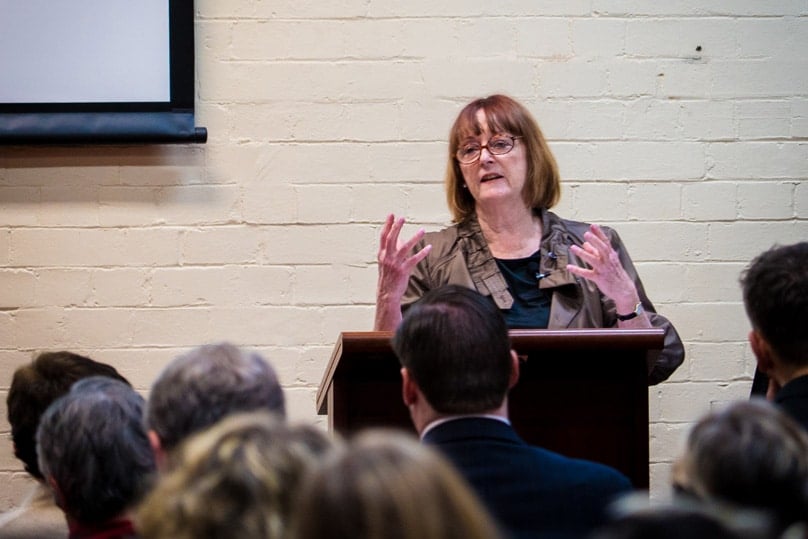
ABC’s Q&A is a well-known, nationally televised, live-to-air program. I was invited to be a panellist to discuss assisted suicide and euthanasia.
Ninety-year-old Ron Fellows and his eighty-one year old wife Patricia, were seated in the front row of the audience. When called on by host Tony Jones, Mr Fellows said, “We have decided that we will not go in to any kind of aged care facility. And if the time comes where we can’t take care of ourselves, we will look for some form of euthanasia.” The audience remained totally silent. He added that their children had accepted their decision, although reluctantly.
A short while later, Jones asked Patricia Fellows whether Ron was also speaking for her and she said yes.
Mrs Fellows then objected to my using the word killing to describe assisted suicide and euthanasia and argued that because she and Ron would each take their own life, “that is definitely the wrong word to be using.” I replied: “But it is still killing yourself … and how you die … has to do with the community.” Mrs Fellows’ one word response was, “Bullshit.” The audience instantly erupted in what seemed to be affirmative laughter. After a considerable pause, she added, “tell it as it is.”
One TV critic wrote, “It may have been Q&A’s most succinct contribution ever. … It was potent, bracing television, and a stray expletive was the least confronting thing about it.” I agree.
Tony Jones characterised the ‘bullshit’ comment as ‘refreshing’, which is difficult to interpret other than as an endorsement of it. Certainly, it subsequently, attracted a great deal of media coverage and even won the Fellows a prize.
Exit International boss and former medical doctor, Philip Nitschke awarded them his ‘Peaceful Pill Prize’ claiming their comments were a “significant contribution to the Australian Euthanasia debate”. Nitschke confirmed the couple are members of his Exit International organisation and said the prize is ‘two redeemable vouchers for 12gm packages of pure sodium pentobarbital (Nembutal). … (But) as possession of this drug in Australia is illegal, the details of the delivery of the prize will be kept confidential. Delivery will be by unconventional means”. Nitschke called the prize a ‘safety net’ for the Fellows.
In effect, the Fellows were proposing that when people feel that they have had what the Dutch call a “completed life” or are “tired of life”, they should be allowed to end their lives.
My fellow Q&A panellist Nikki Gemmell passionately explained that in her research for her book After, she found an “epidemic” of pain and grief among elderly people. She pleaded that those who wanted to end their lives by suicide should be able to have assistance in doing so, in order to avoid a botched suicide attempt or a “lonely death”, such as her mother, who committed suicide, experienced. Nikki did not comment on the Fellows’ plan. Alternative interventions to assisted suicide for pain and grief were not considered.
The Fellows’ and Gemmell’s approaches extend far beyond the claim of pro-euthanasia advocates that assisted suicide and euthanasia will be restricted to terminally ill people, with intractable suffering, who are in the last weeks or days of life.
Why did the audience not react to the Fellows’ suicide plan, and then react so overwhelmingly to the “bullshit” comment? Was it because the audience saw the Fellows’ plan as unsurprising and reasonable? Or were they stunned by the stark publication of a truly shocking plan? You could hear a pin drop.
Researchers studying suicide prevention teach that all suicide threats should be treated as real, but they have different degrees of lethality. Saying, “I’ll commit suicide if my AFL team doesn’t win on Saturday,” is a real suicide threat, but of extremely low lethality, that is, highly unlikely to be carried out. The Fellows’ plans seemed to be of a high degree of lethality.
What message does the deadly silence of the audience on hearing the Fellows’ plan send? That suicide is an appropriate option for those losing independence? That death might be preferable to life in a nursing home? That we should not try to prevent suicide among elderly people? That we are isolated individuals and our deaths, as Mrs Fellows declared, are no business of the wider community or society?
And if we allow assisted-suicide, what about suicide contagion – “copycat” suicides – a well-documented phenomenon? The general suicide rate has increased in jurisdictions with legalised physician-assisted suicide and suicide is the leading cause of death in young adults. This is a serious and major public health concern, which legalising assisted suicide, a society’s ultimate affirmation of suicide’s acceptability, would only magnify.
Advocates of legalising assisted suicide argue there are “good suicides” and “bad suicides” and that the two are entirely different phenomena. These advocates would see the Fellows’ plan as “good suicides”. What impact does that characterisation have on people who live in nursing homes or are mentally or physically fragile or vulnerable? What does it say about us as families, communities and a society that we would see assisting suicide as a preferable approach to trying to provide the care and comfort that would negate a person’s desire to commit suicide? These questions need to be answered for the sake of all those affected by the way Mr and Mrs Fellows plan to die; neither the questions nor their answers are bullshit.
